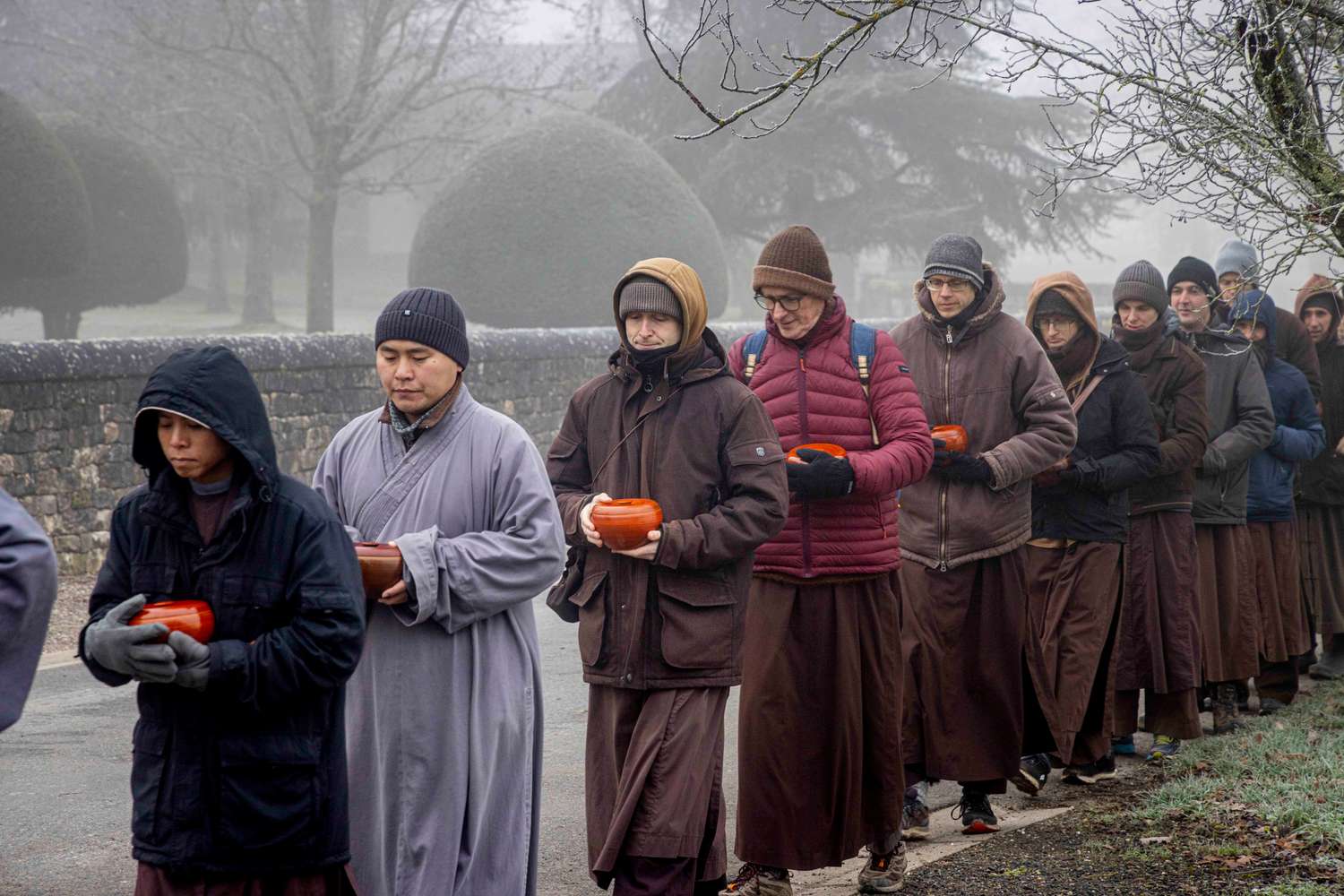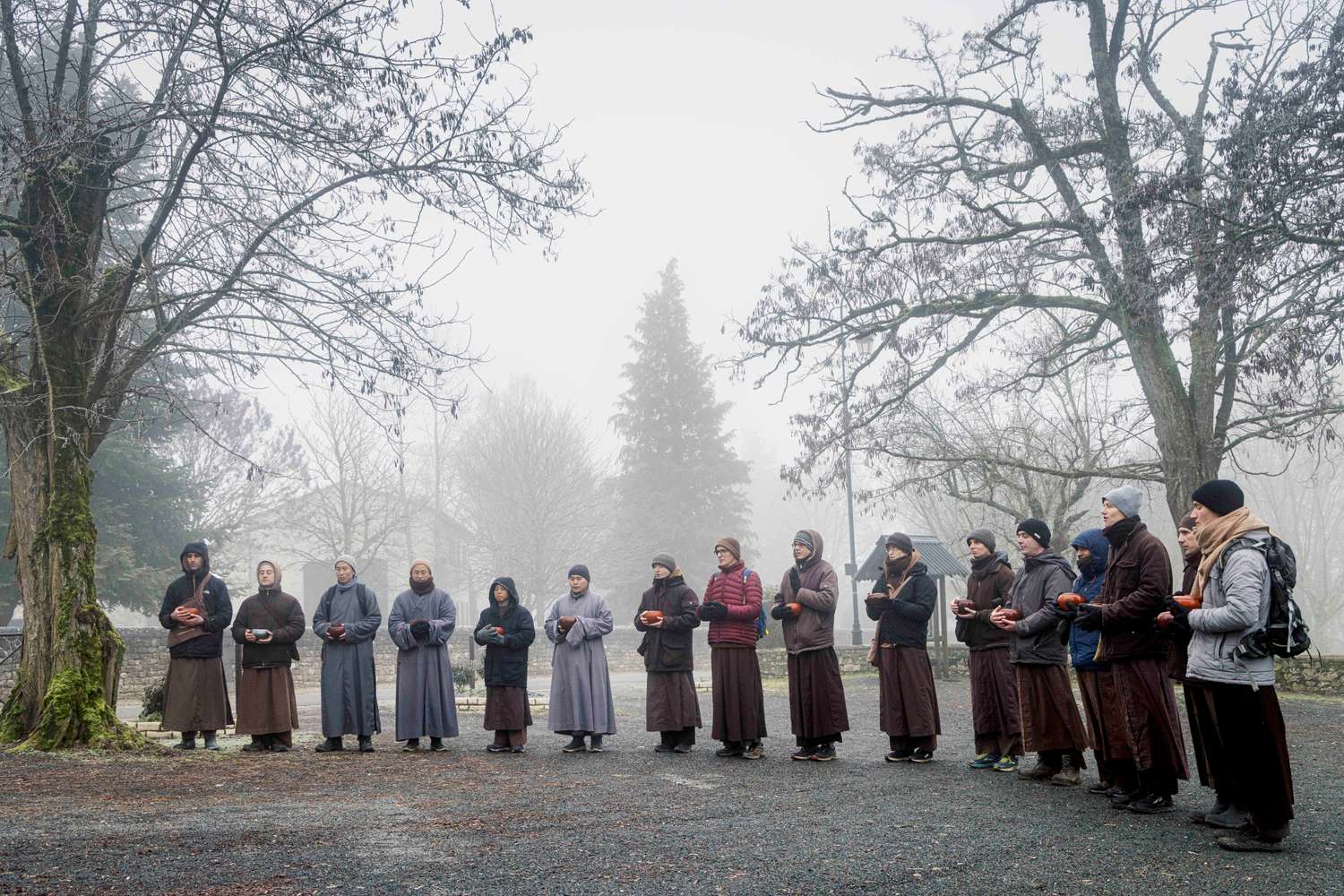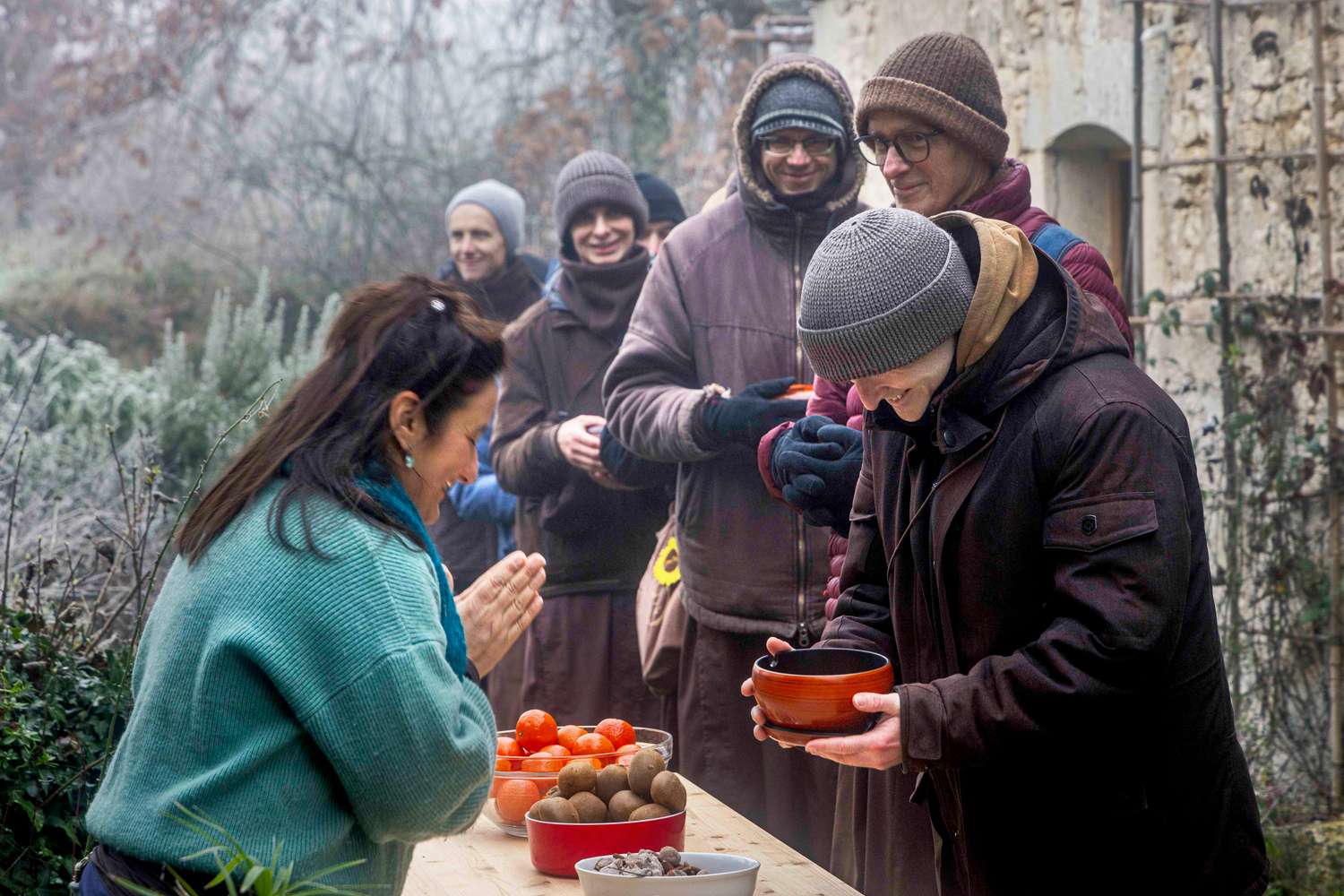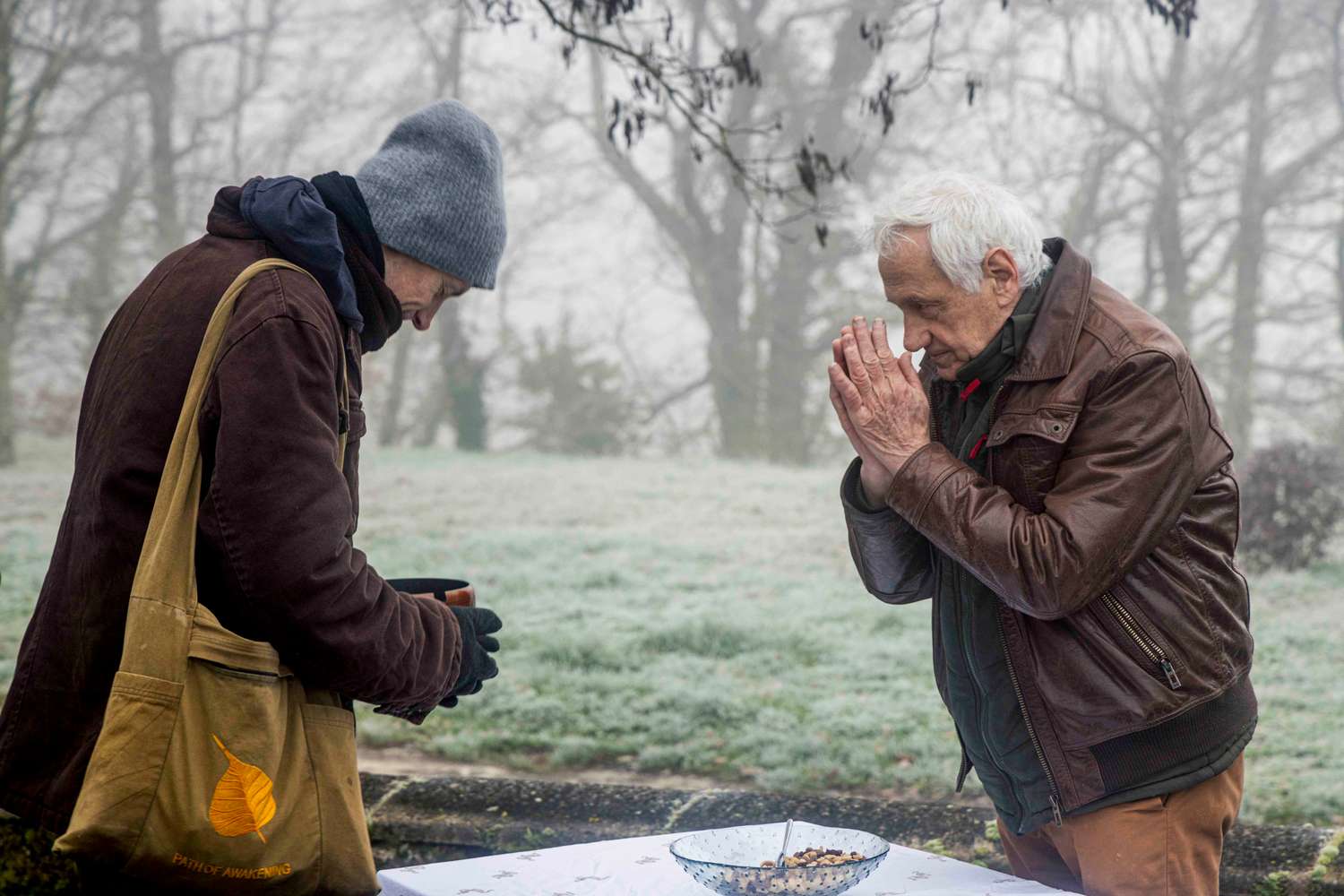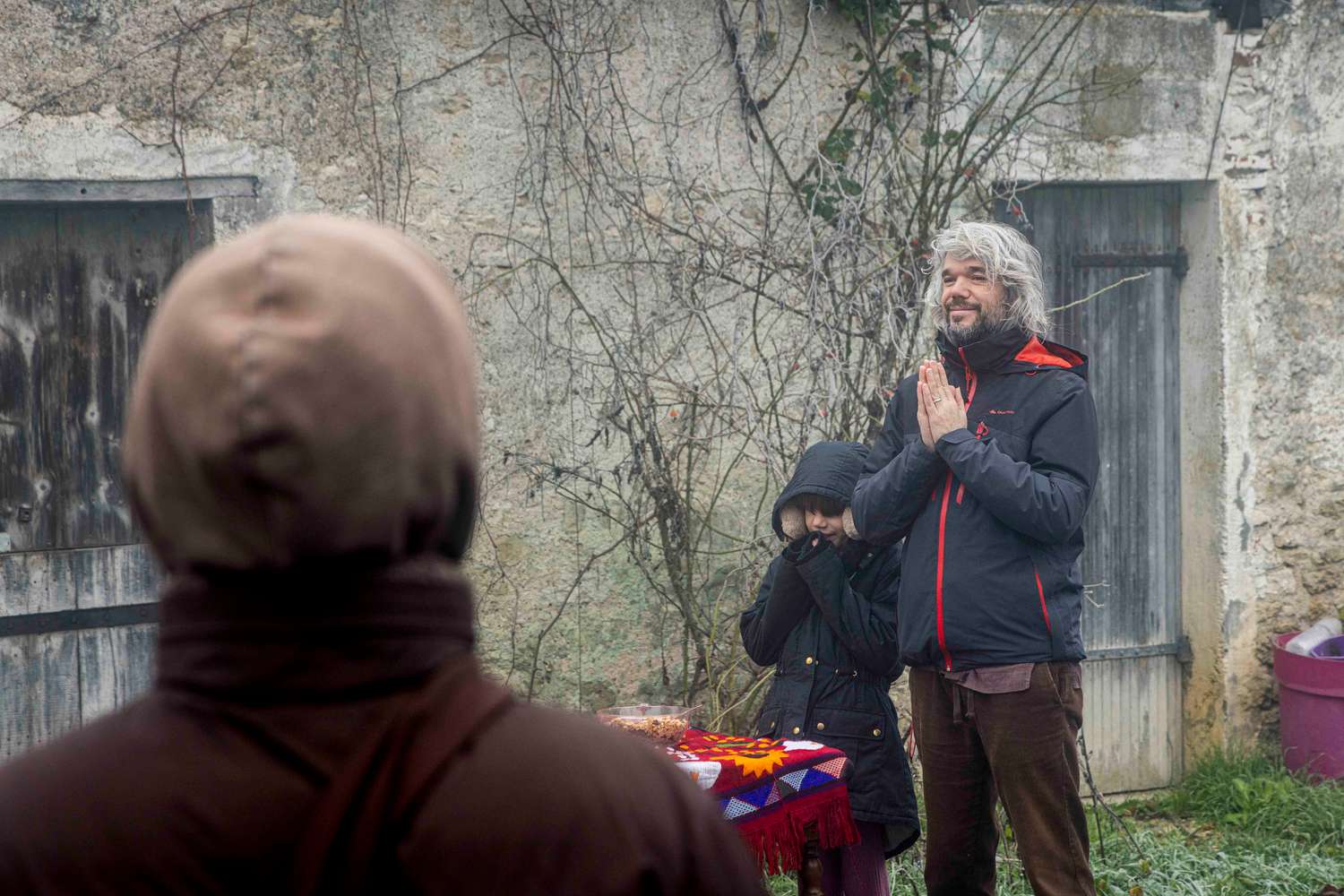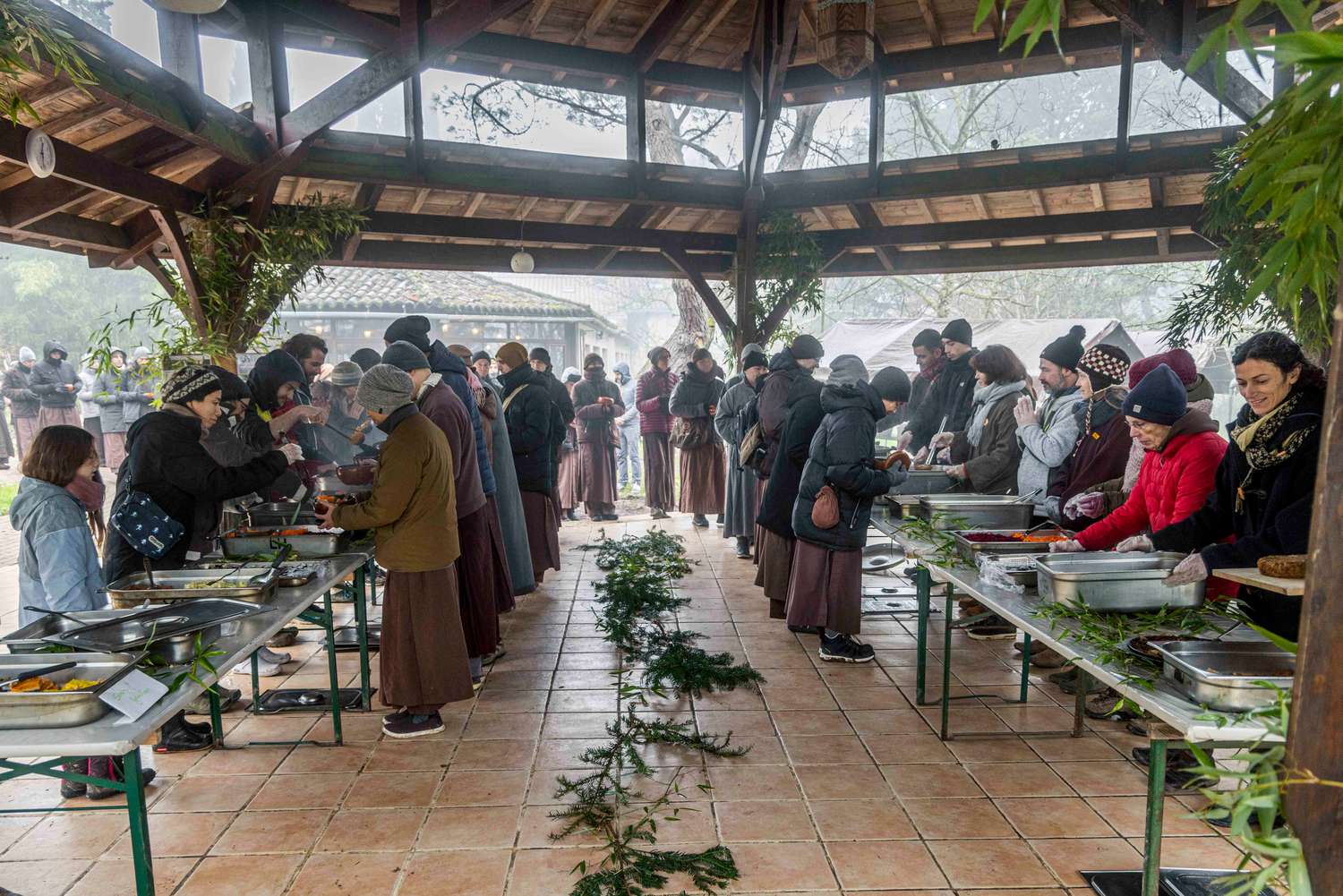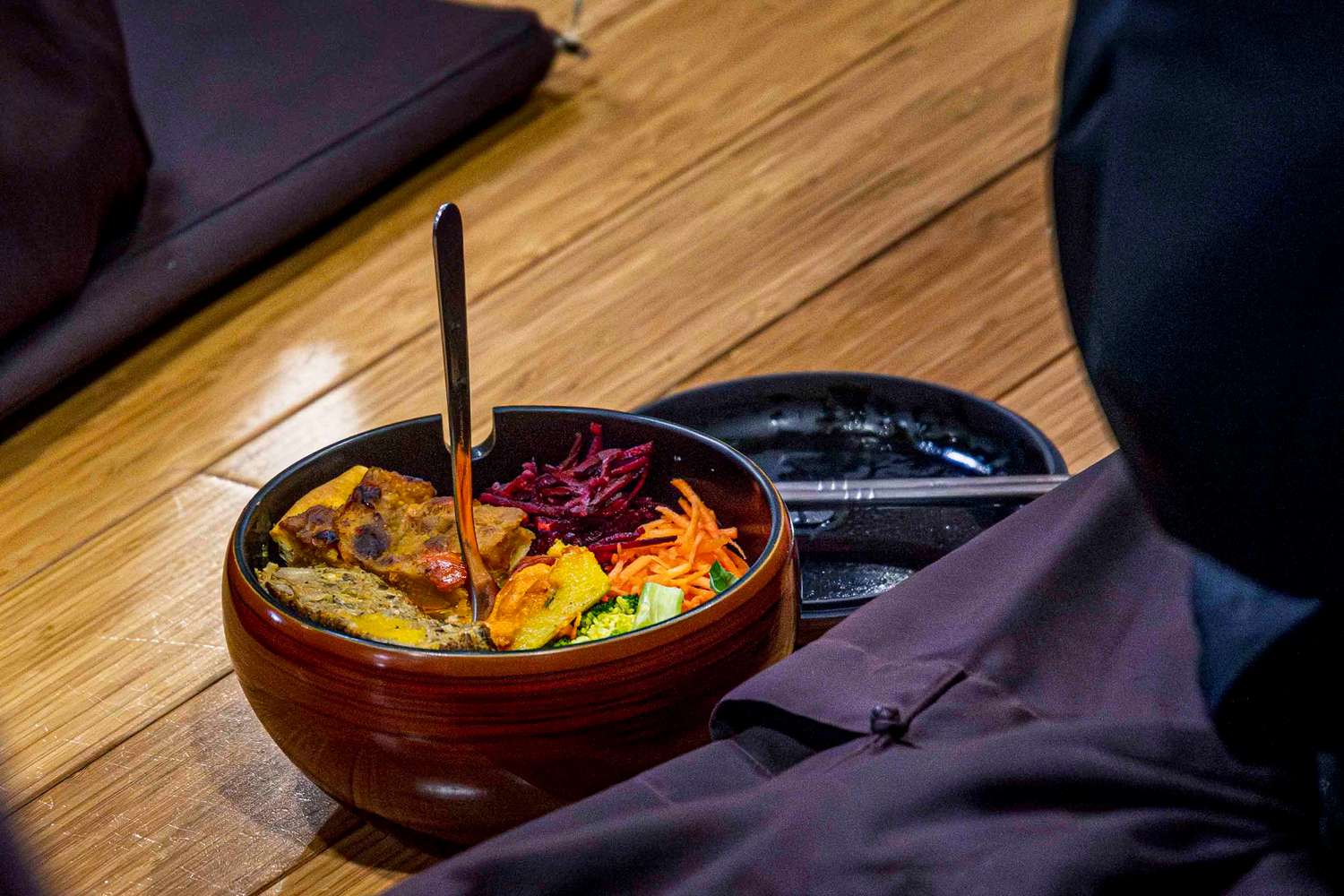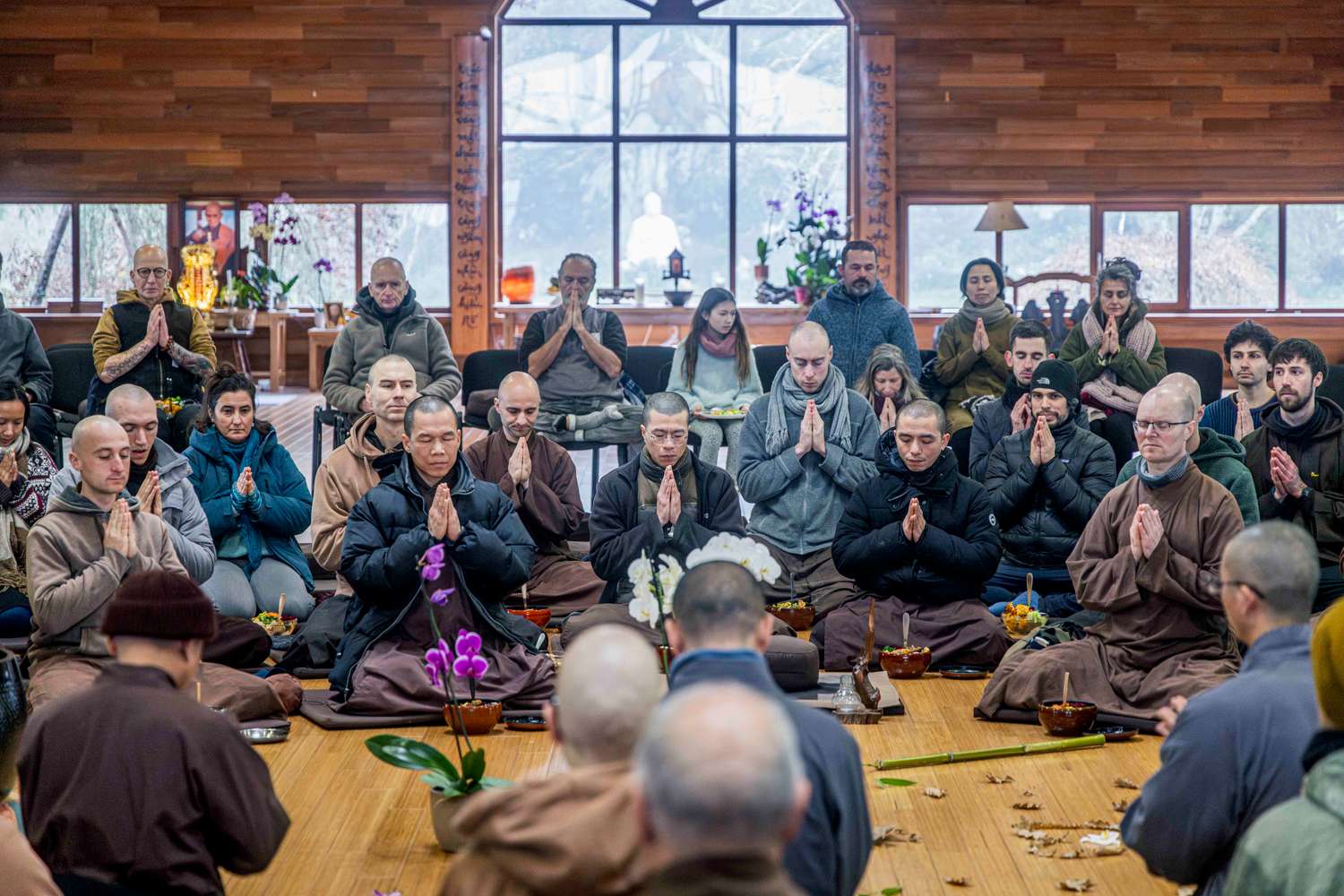
Brother Chân Trời Đức Định
Favorable conditions
A few years ago, during a hike with some of my monastic brothers and sisters in Thénac, the small village where Upper Hamlet is located, the idea came up that we might one day walk from house to house asking for alms from our neighboring friends, as is a tradition that dates back to the Buddha’s time.
At the beginning of this Rains Retreat, I suggested that we do it, and in this way beautifully end our 3-month retreat. At first, I was surprised at how easily and happily the brothers agreed to it. Very soon we had an enthusiastic organizing team of three monks and five lay friends. Throughout the whole project, we were supported by favorable conditions and had very few challenges. It seemed that the conditions were ripe for us to gracefully flow as a sangha. I was astonished that a project involving so many people could manifest so harmoniously.
One body, one heart
On the Saturday morning of 13 January 2024, two groups of brothers took our alms bowls and walked to the village of Thénac, through the countryside of France, when all the trees, grass blades and the whole landscape were covered with a white layer of frost. After receiving offerings from one household, we offered them a chant “May the Day be Well,” bowed in deep gratitude and continued to enjoy our walk.
As we silently walked together in procession, I could feel that we were one body and one heart. I could feel our connection and shared happiness. We walked side-by-side in two rows, with the bowls in our bags during long stretches, and when we arrived at the houses, we switched to a single line, with the bowls in our hands. It was a kind of dance, we would flow together. When the first brother stopped, we would all stop and take our bowls out in unified movements. I instinctively knew when everyone behind me was ready just by hearing the peaceful silence.

Watering the seeds of gratitude and generosity
When we came back to Upper Hamlet, the rest of the sangha, composed of the 3-month retreatants, long-term residents and local sangha members, were absorbed in a joyful service meditation to prepare the hamlet: some were setting up the meditation hall for the whole sangha to have lunch together after the alms round, while others volunteered to cook for the rest of the residents. There was also another group cooking at the nearby sangha organic shop. Some neighboring friends even brought delicious homemade food. The day before, as I took a walk in Thénac, I passed by the home of several practitioners, and saw them cooking through the window. I thought they might be preparing something for tomorrow’s alms offering. I was moved with gratitude, thinking there might be many more of our friends preparing food at that moment for the community with a generous heart.
We then had a final procession in Upper Hamlet, all the monks in ordination order receiving alms in their bowl from the lay practitioners. As I received the food I felt slightly nervous but also very happy to see our friends so wholehearted in serving food to the brothers. After the brothers, our friends also received food and we all entered the meditation hall to eat. We had a silent meal, where we also shared the dried fruits, nuts and other offerings we had received at the houses in Thénac.
The whole event was a chance for many brothers to connect with our friends who live close to the monastery. In daily life and Days of Mindfulness, brothers don’t necessarily have a chance to recognize who is who, especially if they don’t speak the same language as the local friends or don’t attend the same Dharma sharing groups.
I am thankful to the organizing team of this alms round event; everyone embodied the spirit I believe Thay would have suggested to us: we worked together relaxedly, joyfully, harmoniously, efficiently but not caught in expecting certain results. I also feel grateful to my two brothers who joined the team, offering great support. I enjoyed this opportunity to connect with them while serving the sangha together.
Beautiful in every way
At the first of our friends’ houses, I received food in my bowl from a close friend, who actually ordained as a monk the same day as me, and later founded a family. A part of me wasn’t too comfortable for an instant. I didn’t really know where to stand, where he was, what sort of relationship was manifesting between us now.
As our team was organizing for the day, we reflected upon the relationship between monastic and lay practitioners. We thought of the potential for each human being to truly realize the path of practice, regardless of whether they are lay or monastic.
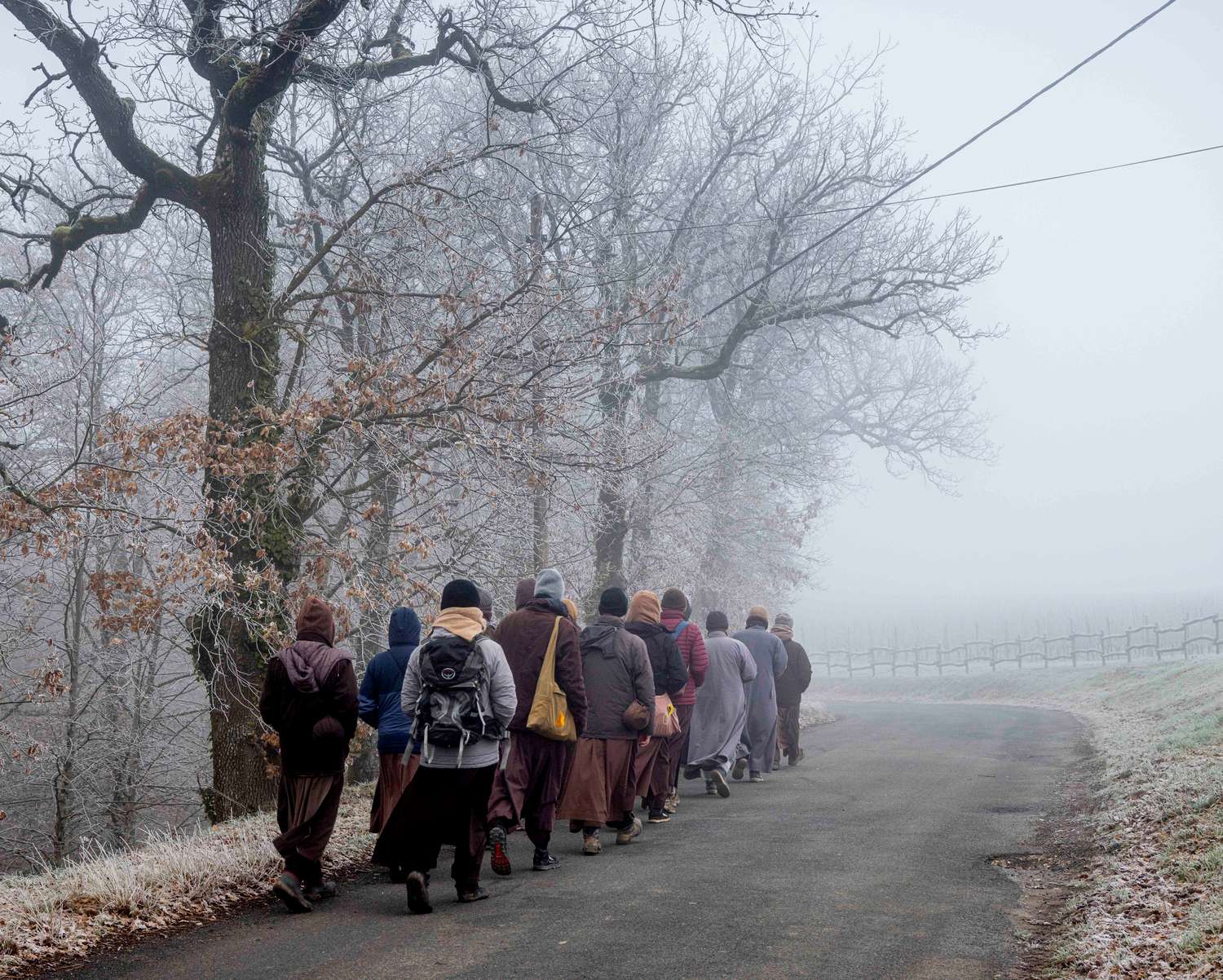
Growing up in my society, relationships based upon generosity, gratitude and freedom from complexes were not always obvious to see and to learn from. Now looking back, and thanks to the teachings we receive and practice together, I can generate a clearer understanding. As monks or as a lay person, we are already wonderful — and thanks to the practice, we have a chance to live a wonderful life with understanding and compassion.
A lay friend is not only a lay friend. As a lay friend, one can offer food and material support to the sangha. They can also offer their practice, as we encourage everyone to do. Or they can offer both. In either way, they contribute to the continuation of the Buddha, of the teachings, and of the Sangha. We monks and nuns are happy with whatever they chose.
As a monk, I can offer my wholehearted practice and learn to understand and embody the teachings and the great love that our ancestral teachers are transmitting to us. When I receive an offering, it reminds me to engage wholeheartedly in what I wish the most for myself and for everyone. When a friend makes an offering to the sangha — or pays their contribution for a retreat with their hard-earned money — they can be reminded of the very same thing: their deep aspiration. This is truly wonderful. We can see our interconnectedness, feel it, be moved by it, and smile.
We have this gatha in our tradition:
The bowl of the Tathāgata
held in my two hands,
I vow to practice with all my heart,
seeing giver, gift, and receiver are one.
from Stepping Into Freedom
I wasn’t at ease receiving food from my friend, as I saw each of us as separated. But as I received, I was not only myself receiving — I was much more. As he offered, he was not only himself. Consider the butterfly and the flower. Should we take one out, the other wouldn’t exist anymore. They have come to depend on each other to manifest; if they are to evolve, they will evolve together. They are neither superior, inferior, nor are equal.
My lay brother and I, we inter-are and there is this wonderful relationship happening that is one of connection, gratitude and generosity. There is the whole world in us as we interact today. I don’t need to feel awkward about myself, I can enjoy the experience.
The monastic order, too, cannot be seen only by itself. It is not really a thing, and it is not separated from the lay order.
Here is a fruit of my practice, challenges and contemplation during this Rains Retreat:
When I can see the bonds of love between beings — latent or manifested
The intrinsic connection between seeds in my store consciousness and what flowers in my daily life:
situations, people, challenges…
The oneness of my true needs and what I receive
Then I can fully receive the alms
And bless the person who offers it
With a true smile
The alms round is a Dharma door
A number of us asked ourselves, “Is this only a symbolic act we are organizing? Do we cultivate the idea we are doing like the Buddha, while, in fact, we have more than enough food and comfort in the monastery?”
I found one element of response in observing how we went about organizing and practicing on that day. I saw we were watering wholesome seeds, individually and collectively. For example, by asking these very questions or as we put our care into harmonizing our views, listening to each other, being and acting in mindfulness, watering seeds of generosity, gratitude, humility, aspiration, determination, and understanding.
The second element of response I found is given in this sentence of the Vimalakirti Sutra: “It is not in order to eat that you make the alms-round.” Thay further explains, “The alms round is a practice in itself and is not essentially a means for obtaining food to eat.” It is in order to do the alms round that we do the alms round, not essentially in order to eat. Likewise, it is in order to make an offering that one makes an offering, not essentially in order to feed the monks or to generate some merit.
We organized this in order to enjoy it deeply, and I think we did.
On this day of alms, we could also be mindful of our relationship to food, our own feelings, and take the opportunity to reflect upon our true needs as a practitioner, and our true needs as a community that shares the practice internationally through numerous means.
Living simply,
in body and also in mind,
is a deep wish of mine,
a means to living deeply.
Thank you, dear beloved Sangha, for being my spiritual family, and for making possible countless wonderful moments such as this day. We can celebrate our happiness and commitment to walking the path together.
